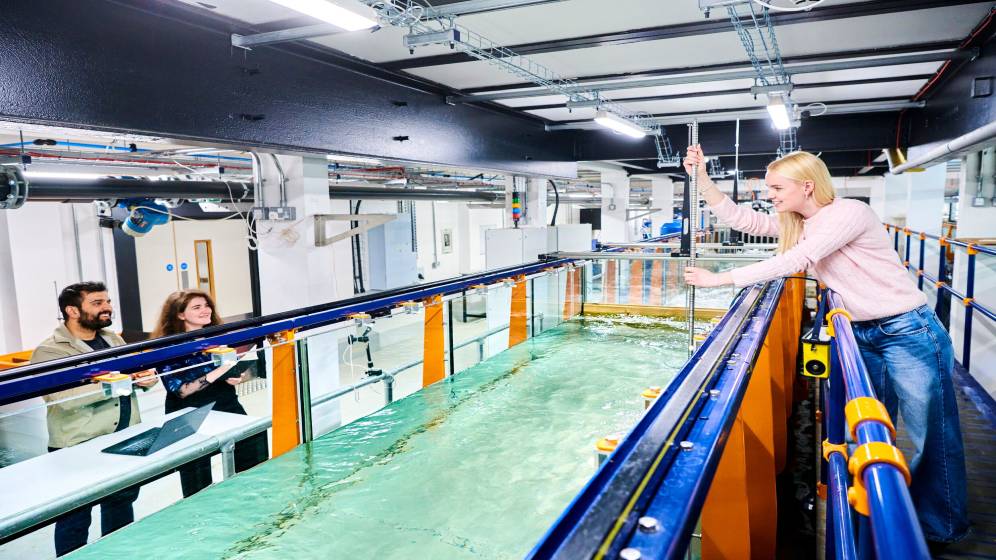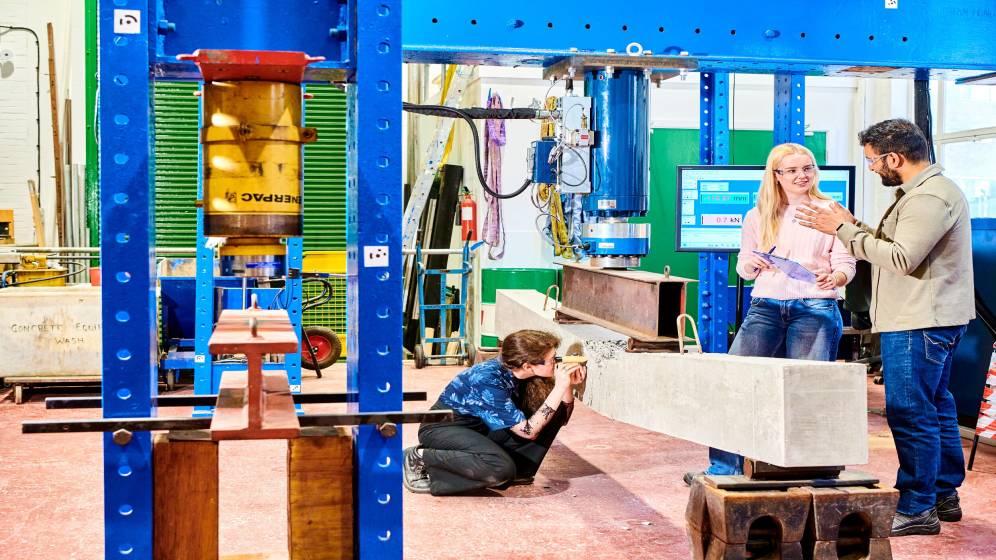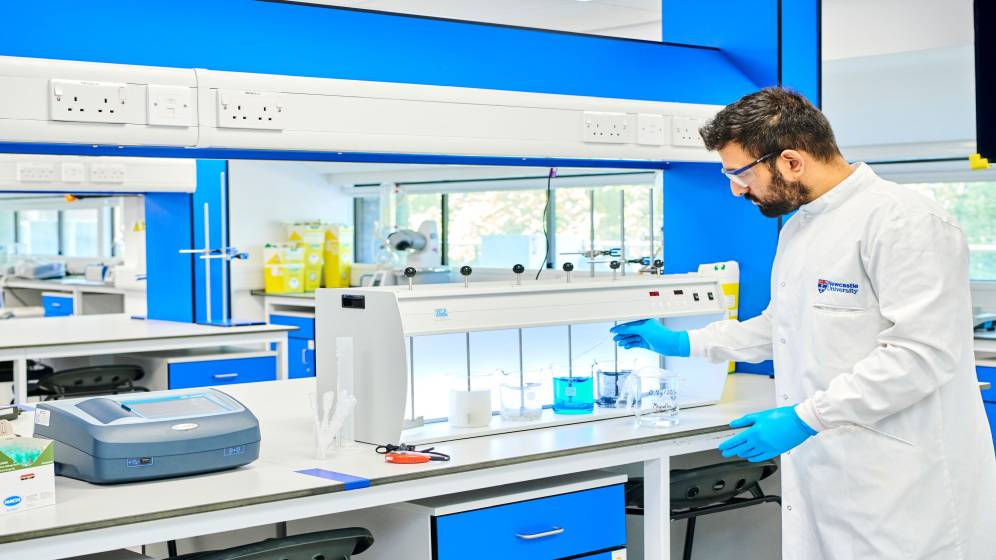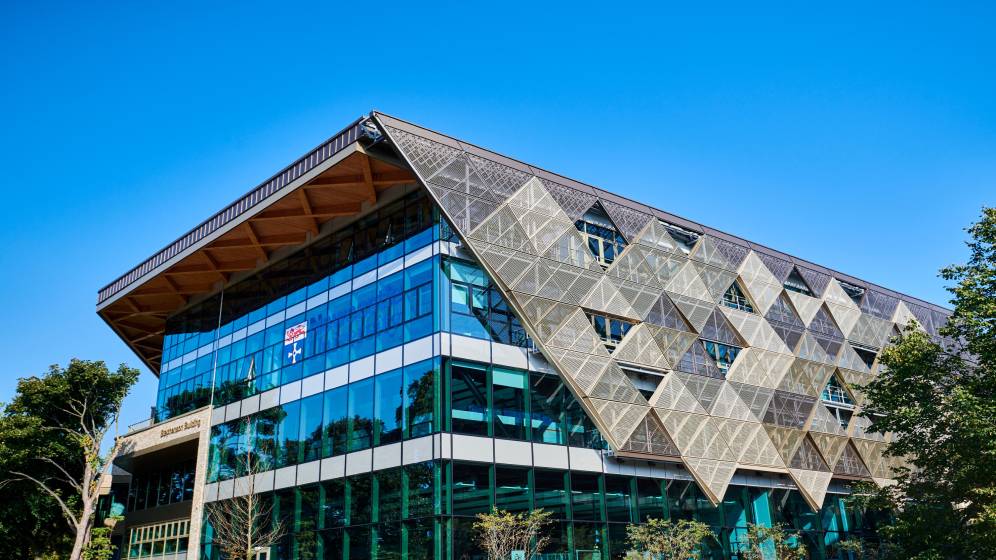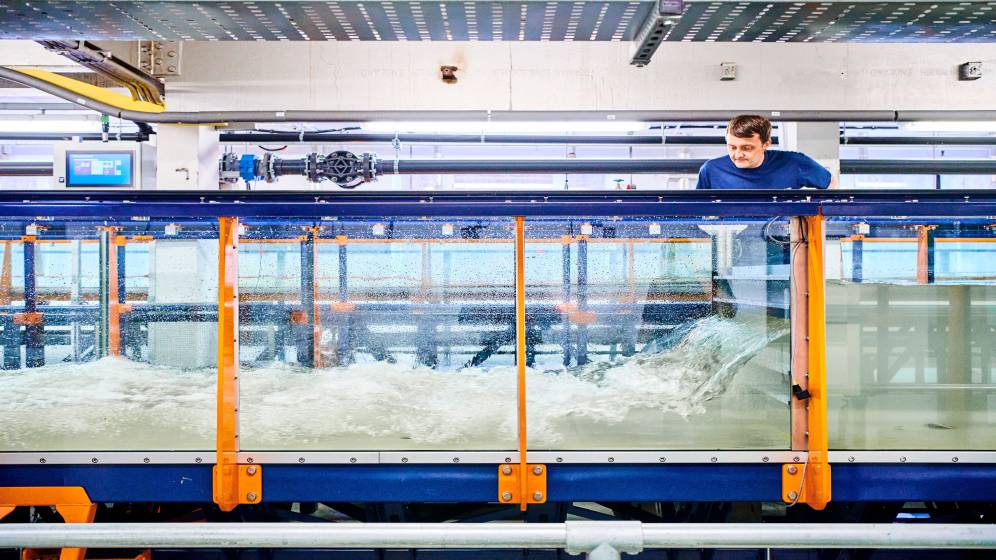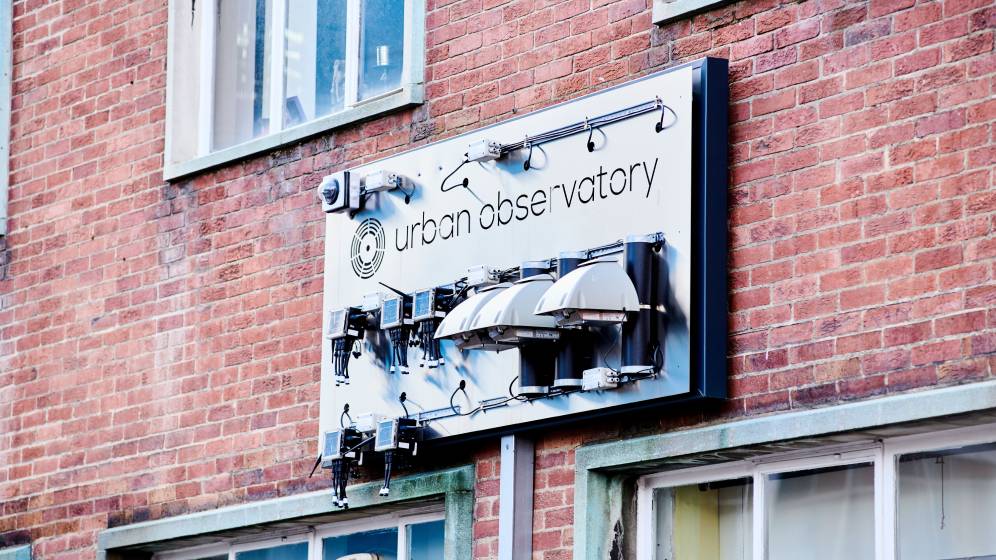Civil Engineering BEng Honours
- UCAS code: H200
- Full time
- 3 years
Our professionally accredited Civil Engineering BEng Honours degree equips you with core engineering knowledge and the practical skills most sought after by employers in this sector.
You are currently viewing course information for entry year: 2026
Next start date:
- September 2026
UCAS Institution name and code:
- NEWC / N21
Course overview
This professionally accredited, three-year degree will equip you with the broad-ranging engineering knowledge needed to design, create real-world infrastructure.
This programme offers a practical, design-led focus. During the degree you'll work in our specialist labs. You'll use industry-standard equipment, digital skills, and analytical techniques to gain design experience on a local to global scale. This is supported by our industry links and a team of world-class researchers.
You'll also learn how engineers address global challenges such as climate change, low carbon targets, and resource scarcity to provide for infrastructure needs. You'll emerge as a well-rounded engineer, with knowledge and skills across all the integrated civil engineering disciplines:
- infrastructure
- modelling and informatics
- environmental systems
- human and management systems
- surveying
BEng or MEng?
Both our BEng degree and specialist MEng degrees provide a pathway to becoming a Chartered Engineer. This is one of the most recognisable international engineering qualifications.
Our MEng degrees are a direct route to becoming a Chartered Engineer (CEng). You don’t need to study any more qualifications after your degree to work towards chartered status.
Our three-year BEng degree can also lead to Chartered Engineer status. However, you’ll need to complete further study, such as an approved master’s degree.
READ MORE
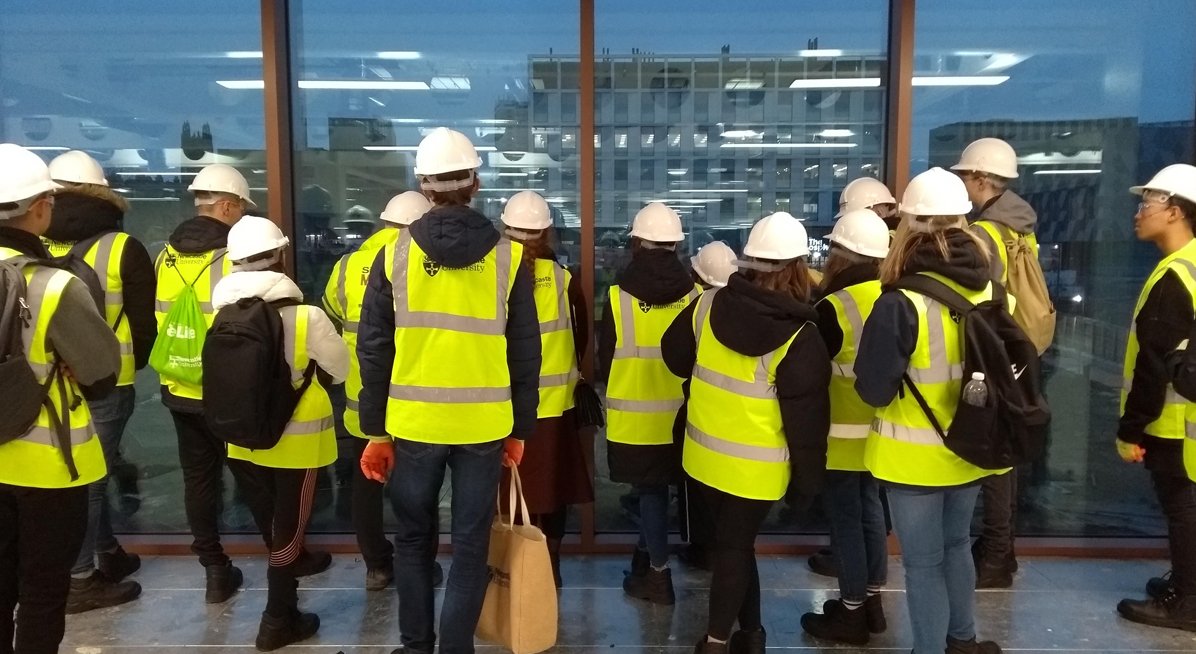
Your course and study experience - disclaimers and terms and conditions
Please rest assured we make all reasonable efforts to provide you with the programmes, services and facilities described. However, it may be necessary to make changes due to significant disruption, for example in response to Covid-19.
View our Academic experience page, which gives information about your Newcastle University study experience for the academic year 2025-26.
See our terms and conditions and student complaints information, which gives details of circumstances that may lead to changes to programmes, modules or University services.
Additional information
This degree allows you to explore several engineering disciplines in year one. This flexible route is taught across Civil, Electrical & Electronic and Mechanical Engineering.
You'll gain an understanding of engineering in a multidisciplinary context. You'll develop diverse skills relevant to the needs of industry and today’s global challenges.
After successfully completing Stage 1, you'll have the option of transferring on to one of the accredited Civil, Electrical & Electronic or Mechanical Engineering degrees. This is subject to the degree programme regulations and capacity of the degree you are transferring to.
Quality and ranking
Professional accreditation and recognition
All professional accreditations are reviewed regularly by their professional body.
Modules and learning
Modules
The information below is intended to provide an example of what you will study.
Most degrees are divided into stages. Each stage lasts for one academic year, and you'll complete modules totalling 120 credits by the end of each stage.
Our teaching is informed by research. Course content may change periodically to reflect developments in the discipline, the requirements of external bodies and partners, and student feedback.
Optional module availability
Student demand for optional modules may affect availability.
Full details of the modules on offer will be published through the Programme Regulations and Specifications ahead of each academic year. This usually happens in May.
To find out more please see our terms and conditions
Stage 1 will provide a broad introduction to the principles of engineering. You will gain an understanding of design processes in a multi-disciplinary context. This will aid the development for your professional skills. You will also focus on engineering materials, mechanics, and electrical and electronic engineering.
Modules
In Stage 2, you'll delve further into key topics, with modules such as design of sustainable engineering systems, structural analysis, land traffic and highways, and hydraulics.
Modules
Stage 3 will involve an in-depth project, allowing you to carry out a substantial, individual piece of work addressing current and future issues in civil engineering.
Alongside this project, you'll also complete modules covering areas such as construction management, engineering ethics and sustainability, geotechnical design, and design of building systems.
Modules
We base these figures and graphs on the most up-to-date information available to us. They are based on the modules chosen by our students in 2024-25.
Teaching time is made up of:
- scheduled learning and teaching activities. These are timetabled activities with a member of staff present.
- structured guided learning. These are activities developed by staff to support engagement with module learning. Students or groups of students undertake these activities without direct staff participation or supervision
Teaching and assessment
Teaching methods
You'll learn through:
- lectures
- practical work
- site visits
- individual study
- group work
- tutorials
- lab work
Assessment methods
You'll be assessed through a combination of:
-
Assessments
-
Assignments – written or fieldwork
-
Case studies
-
Coursework
-
Group work
-
Practical sessions
-
Presentations
-
Projects
-
Seminar tasks/exercises
Skills and experience
Practical skills
You'll gain hands-on experience in our cutting-edge specialist labs. Here you'll test your design decisions, explore material behaviour, and conduct experimental work in our advanced structures labs.
You will benefit from our new multi-disciplinary environmental lab. You'll also enjoy full-scale field facilities off campus. This includes flood defence schemes, electric vehicles, and an engineering embankment, ensuring you develop real-world skills for a dynamic career in engineering.
Business skills
You'll engage in design-focused modules that sharpen your professional skills and refine your critical thinking. You'll complete reflective logs that mirror those used in industry.
Immersive site visits will give you first-hand insight into real-world engineering, allowing you to observe and learn from experienced professionals in action.
Research skills
During your studies you'll be taught by world-class researchers, with cutting-edge research at the forefront of your learning. Our academic staff are experts in their field, with a diverse range of research strengths. See our research section for more information.
You'll also undertake independent projects based around the latest industry developments, conducting your own research.
Opportunities
Work placement
This civil engineering degree is also available with a year's work placement, as a four-year programme.
You'll apply to spend 9 to 12 months working in any organisation in the world, and receive University support from our dedicated team to secure your dream placement. Work placements take place in Stage 3.
You'll gain first-hand experience of working in the sector, putting your learning into practice and developing your professional expertise.
Placements are subject to availability.
Facilities and environment
Facilities
Civil Engineering is taught at our city-centre campus in the Cassie Building, part of the integrated School of Engineering.
You’ll have access to world-class facilities and living labs used across disciplines, including:
- Heavy Structures Lab
- Geotechnical and Materials Labs
- Novak Hydraulic Lab
- Makerspace for prototyping and innovation
- High-performance computing systems
- Analytical and bio-labs
- National Green Infrastructure Facility
- BE:WISE – Europe’s largest wastewater treatment research facility
- Urban Observatory – monitoring 50+ types of city-wide data
- Millennium Laboratory
- Merz Court Pilot Plant
- Electronics Teaching Lab
- Clean-Room Microfabrication Lab
These facilities support practical learning, research, and real-world project experience.
Support
To support you in your studies, all new students entering year 1 or year 2 will receive a start-up pack containing essential personal protective equipment.
You'll receive comprehensive support from the moment you arrive at the University. You'll be supported by personal tutors, stage tutors, and degree tutors. You'll also benefit from the School's student buddies scheme.
Your future
When you graduate from this programme, you'll be highly employable with a diverse and transferable skill set. You'll have the specialised expertise needed to excel as a civil or structural engineer.
Our recent graduates have gone on to work in roles such as:
- graduate civil engineer
- graduate structural engineer
- consultant to architect
- design-build contractor
They've taken on these roles with companies such as:
- AtkinsRéalis
- Arup
- AECOM
- Jacobs
- Transport for London
- Balfour Beatty
Graduates have pursued careers various industries, including mining, nuclear, oil and gas, and renewable energy.
Industry links
We have strong links with regional partners and industry leaders, including Robert McAlpine, AECOM, Wood Group, Bowmer + Kirkland, and many more.
Through these links, you'll have access to guest lectures and site visits, as well as networking and placement opportunities.
The North East regional office of the Institute of Civil Engineering is based within the department, so you'll have plenty of opportunities to get involved.
Make a difference
Sorry, you need JavaScript to view this video
Careers support
Our Careers Service is one of the largest and best in the country, and we have strong links with employers. We provide an extensive range of opportunities to all students through our ncl+ initiative.
Visit our Careers Service website
Recognition of professional qualifications outside of the UK
If you’re studying an accredited degree and thinking about working in Europe after you graduate, the best place to find current information is the UK Government’s guidance on recognition of UK professional qualifications in EU member states. This official resource explains whether your profession is regulated in another country, what steps you need to take, and which organisation you should contact.
Entry requirements
All candidates are considered on an individual basis and we accept a broad range of qualifications.
The entrance requirements and offers below apply to 2026 entry.
| A-Level | |
|---|---|
| International Baccalaureate | |
|---|---|
Other UK and the Republic of Ireland qualifications
Alternative offers at Newcastle
Through one of our contextual or alternative offer routes, you could receive an offer of up to three grades lower than the typical requirements.
Contextual offers
We use certain contextual data from your UCAS form, alongside your application, to consider challenges that you may have faced in your education and the potential effect this may have had on your qualifications. This means you may be eligible to receive a lower contextual offer.
PARTNERS offers
One of the largest and longest support entry routes to university of its kind for students from underrepresented backgrounds. We support applicants from application through to study.
Realising Opportunities offers
A unique programme delivered in collaboration with 10 leading, research-intensive universities in the UK. The programme is open to students in Year 12/first year of college.
Pathways to Newcastle offers
Pathways to Newcastle, our national skills entry route, is available for specific subject areas.
High Performance Athletes
We support promising athletes at the application stage, who compete in regional, national or international levels in their sport.
Qualifications from outside the UK
English Language requirements
Entrance courses (INTO)
International Pathway courses are specialist programmes designed for international students who want to study in the UK. We provide a range of study options for international students in partnership with INTO.
These courses are specifically designed for international students who want to study in the UK and progress onto one of our undergraduate degrees. Our International Study Centre, has a range of study options including:
- International Foundation
- International Year One
- English Language courses
Find out more about International Pathway courses
Admissions policy
This policy applies to all undergraduate and postgraduate admissions at Newcastle University. It is intended to provide information about our admissions policies and procedures to applicants and potential applicants, to their advisors and family members, and to staff of the University.
University Admissions Policy and related policies and procedures
Credit transfer and Recognition of Prior Learning
Recognition of Prior Learning (RPL) can allow you to convert existing relevant university-level knowledge, skills and experience into credits towards a qualification. Find out more about the RPL policy which may apply to this course.
Additional information
Advice on maths and science requirements
If you don’t think you will have the exact mathematics and science qualifications referred to in our entry requirements by the time you need them, you may not be sure what to do.
- If you have a maths qualification but will not have it at A Level (or equivalent) when you start your degree, you should apply for the relevant degree with Foundation Year. We may give you the opportunity to take the Newcastle University Pre-Entry Maths Course* and the option to start in Year 1 if we think that this will be the best route for you.
- If you have A Level Maths (or equivalent) already but not at the required grade, you should contact us for advice. We may decide that you could be considered for Foundation Year entry, or it may be that this course is not the best option for you.
- If you will not have the equivalent of an A Level in the science subject (if any) required, you should apply for the relevant degree with Foundation Year.
If you are still not sure, don’t worry. Whatever you apply for, our Admissions Tutors will help you decide which is the best route for you. They may, therefore, make you an offer for a different course from the one you apply for (eg Foundation Year entry instead of Year 1 entry).
*The Newcastle University Pre-Entry Maths Course aims to provide the requisite mathematical skills and concepts needed on our engineering, maths and physics degree courses and to prepare students for the modes of learning they will encounter. The materials for the course are delivered electronically and include opportunities to practise your skills. You study the materials in your own time and, when you are ready, you book your exam with the Engineering School to which you have applied. A fee of £150 is payable at the time of booking the exam or shortly before the date set for examination.
Tuition fees and scholarships
Tuition fees for academic year 2026-2027
The 2026 entry home fees have not yet been confirmed.
| Qualification: BEng Honours | |
|---|---|
|
Home students full time 3 years |
Tuition fees (Year 1)
Not set |
|
International students full time 3 years |
Tuition fees (Year 1)
30,700 |
Year abroad and additional costs
For programmes where you can spend a year on a work placement or studying abroad, you will receive a significant fee reduction for that year.
Some of our degrees involve additional costs which are not covered by your tuition fees.
Scholarships
Find out more about:
Open days and events
You'll have a number of opportunities to meet us throughout the year at our on-campus and virtual open days.
You'll be able to:
- explore our beautiful campus
- find out about our vibrant city
- discover what students think about studying at Newcastle
You'll also have the opportunity to speak to academic staff and find out more about the subjects you're interested in.
Find out about how you can visit Newcastle in person and virtually.
We regularly travel overseas to meet with students interested in studying at Newcastle University. Visit our events calendar to find out when we're visiting your region.
How to apply
Apply through UCAS
To apply for undergraduate study at Newcastle University, you must use the online application system managed by the Universities and Colleges Admissions Service (UCAS). All UK schools and colleges, and a small number of EU and international establishments, are registered with UCAS. You will need:
- the UCAS name and institution codes for Newcastle University (NEWC/N21)
- the UCAS code for the course you want to apply for
- the UCAS 'buzzword' for your school or college
If you are applying independently, or are applying from a school or college which is not registered to manage applications, you will still use the Apply system. You will not need a buzzword.
Apply through UCASApply through an agent
International students often apply to us through an agent. Have a look at our recommended agents and get in touch with them.
Get in touch
By phone
Call us on +44 (0) 191 208 3333 and press option 1. Our opening hours are Monday to Friday 10am until 4pm.
Live chat
Our NCL chatbot might be able to give you an answer straight away. If not, it’ll direct you to someone who can help.
You'll find our NCL chatbot in the bottom right of this page.
Online
Chat to our students
Choosing a university is a big decision. If you've got questions about a particular course, student life or the city of Newcastle, why not chat to our friendly students or graduates!
Keep updated
We regularly send email updates and extra information about the University.
Receive regular updates by email







